Economics 1 Assignment: Analysis of Workshop Questions (2019)
VerifiedAdded on 2023/04/24
|7
|1473
|284
Homework Assignment
AI Summary
This economics assignment delves into three key areas: the Human Development Index (HDI) as a measure of economic and social well-being, the role of unemployment in an economy, and the impact of globalization on poverty in developing nations. The assignment critically analyzes the HDI, providing examples of its strengths and weaknesses. It then examines unemployment, exploring different viewpoints on its necessity. Finally, it evaluates the claim that globalization has reduced poverty, presenting arguments from both supporters and opponents, supported by relevant citations. The assignment demonstrates an understanding of economic concepts and the ability to analyze complex economic issues.
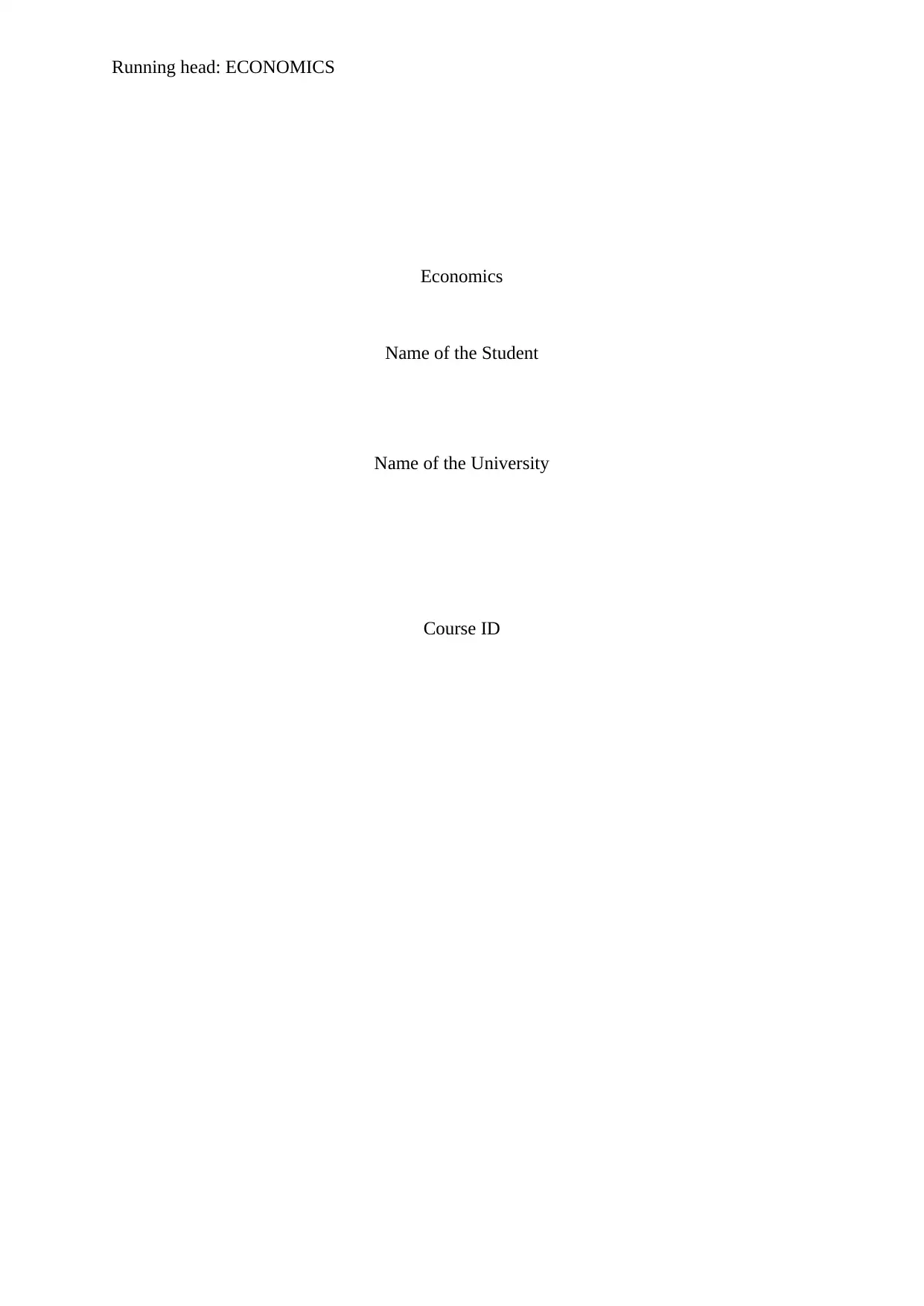
Running head: ECONOMICS
Economics
Name of the Student
Name of the University
Course ID
Economics
Name of the Student
Name of the University
Course ID
Paraphrase This Document
Need a fresh take? Get an instant paraphrase of this document with our AI Paraphraser

1ECONOMICS
Table of Contents
Question 1..................................................................................................................................2
Question 2..................................................................................................................................3
Question 3..................................................................................................................................4
References..................................................................................................................................6
Table of Contents
Question 1..................................................................................................................................2
Question 2..................................................................................................................................3
Question 3..................................................................................................................................4
References..................................................................................................................................6
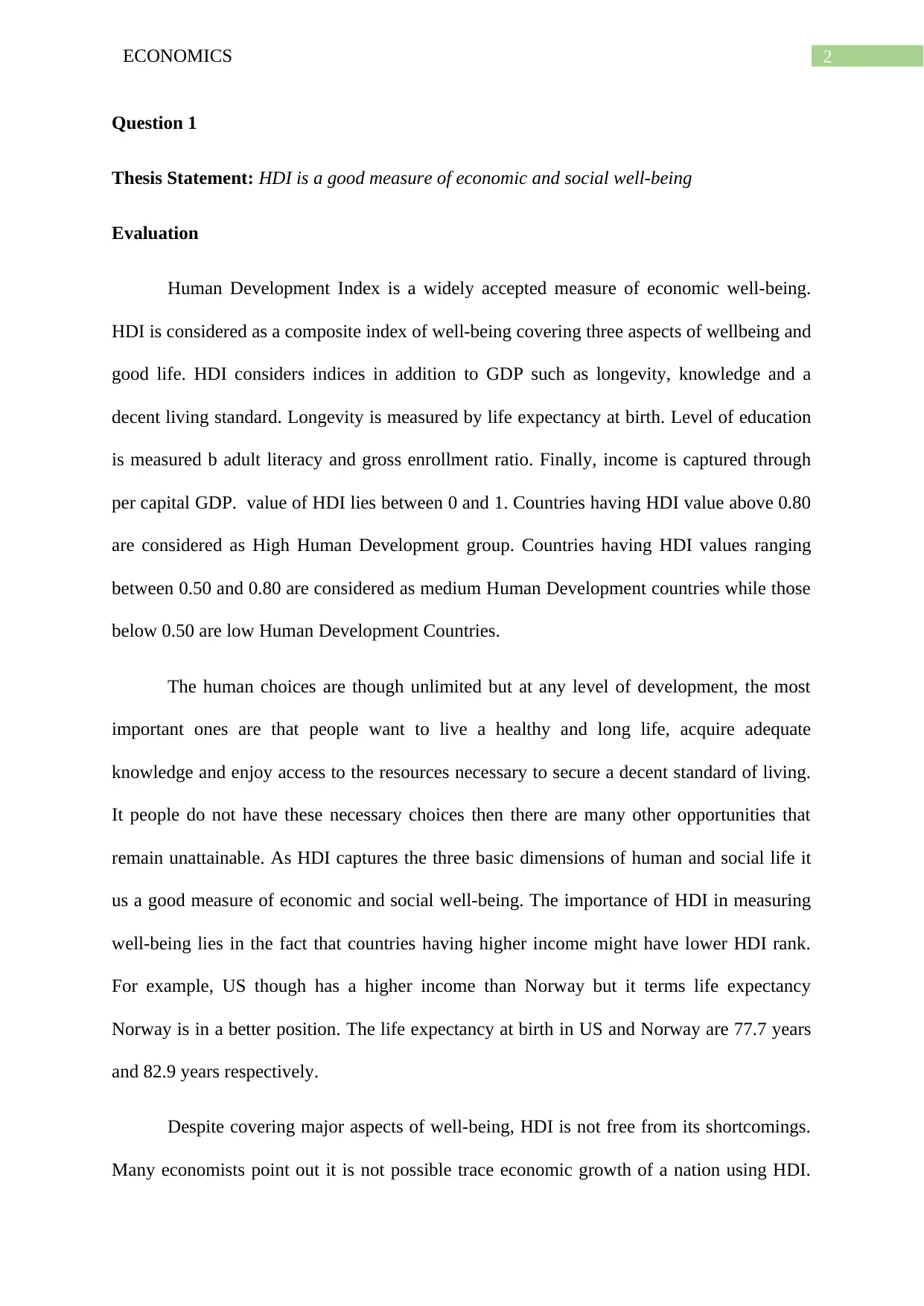
2ECONOMICS
Question 1
Thesis Statement: HDI is a good measure of economic and social well-being
Evaluation
Human Development Index is a widely accepted measure of economic well-being.
HDI is considered as a composite index of well-being covering three aspects of wellbeing and
good life. HDI considers indices in addition to GDP such as longevity, knowledge and a
decent living standard. Longevity is measured by life expectancy at birth. Level of education
is measured b adult literacy and gross enrollment ratio. Finally, income is captured through
per capital GDP. value of HDI lies between 0 and 1. Countries having HDI value above 0.80
are considered as High Human Development group. Countries having HDI values ranging
between 0.50 and 0.80 are considered as medium Human Development countries while those
below 0.50 are low Human Development Countries.
The human choices are though unlimited but at any level of development, the most
important ones are that people want to live a healthy and long life, acquire adequate
knowledge and enjoy access to the resources necessary to secure a decent standard of living.
It people do not have these necessary choices then there are many other opportunities that
remain unattainable. As HDI captures the three basic dimensions of human and social life it
us a good measure of economic and social well-being. The importance of HDI in measuring
well-being lies in the fact that countries having higher income might have lower HDI rank.
For example, US though has a higher income than Norway but it terms life expectancy
Norway is in a better position. The life expectancy at birth in US and Norway are 77.7 years
and 82.9 years respectively.
Despite covering major aspects of well-being, HDI is not free from its shortcomings.
Many economists point out it is not possible trace economic growth of a nation using HDI.
Question 1
Thesis Statement: HDI is a good measure of economic and social well-being
Evaluation
Human Development Index is a widely accepted measure of economic well-being.
HDI is considered as a composite index of well-being covering three aspects of wellbeing and
good life. HDI considers indices in addition to GDP such as longevity, knowledge and a
decent living standard. Longevity is measured by life expectancy at birth. Level of education
is measured b adult literacy and gross enrollment ratio. Finally, income is captured through
per capital GDP. value of HDI lies between 0 and 1. Countries having HDI value above 0.80
are considered as High Human Development group. Countries having HDI values ranging
between 0.50 and 0.80 are considered as medium Human Development countries while those
below 0.50 are low Human Development Countries.
The human choices are though unlimited but at any level of development, the most
important ones are that people want to live a healthy and long life, acquire adequate
knowledge and enjoy access to the resources necessary to secure a decent standard of living.
It people do not have these necessary choices then there are many other opportunities that
remain unattainable. As HDI captures the three basic dimensions of human and social life it
us a good measure of economic and social well-being. The importance of HDI in measuring
well-being lies in the fact that countries having higher income might have lower HDI rank.
For example, US though has a higher income than Norway but it terms life expectancy
Norway is in a better position. The life expectancy at birth in US and Norway are 77.7 years
and 82.9 years respectively.
Despite covering major aspects of well-being, HDI is not free from its shortcomings.
Many economists point out it is not possible trace economic growth of a nation using HDI.
⊘ This is a preview!⊘
Do you want full access?
Subscribe today to unlock all pages.

Trusted by 1+ million students worldwide
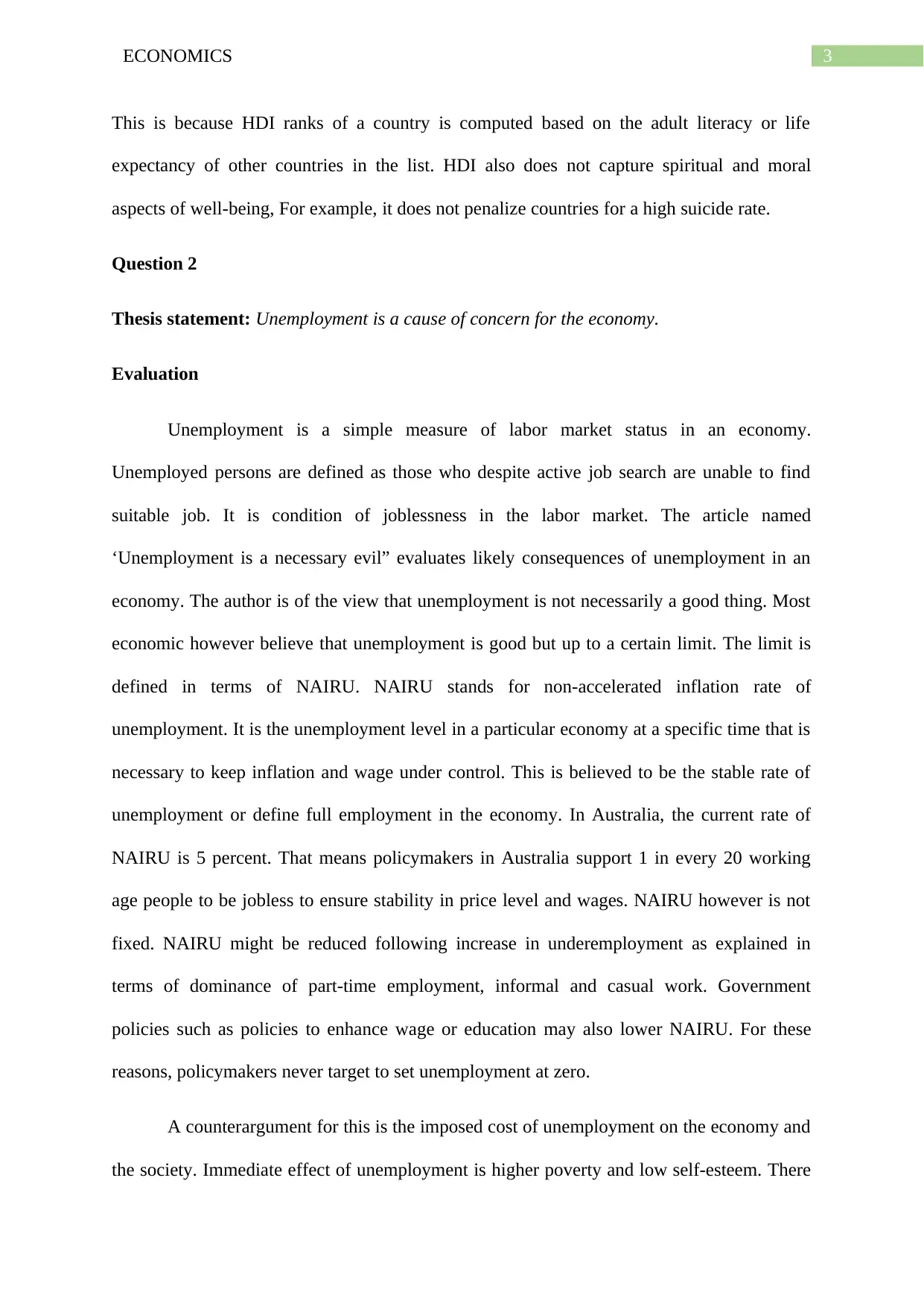
3ECONOMICS
This is because HDI ranks of a country is computed based on the adult literacy or life
expectancy of other countries in the list. HDI also does not capture spiritual and moral
aspects of well-being, For example, it does not penalize countries for a high suicide rate.
Question 2
Thesis statement: Unemployment is a cause of concern for the economy.
Evaluation
Unemployment is a simple measure of labor market status in an economy.
Unemployed persons are defined as those who despite active job search are unable to find
suitable job. It is condition of joblessness in the labor market. The article named
‘Unemployment is a necessary evil” evaluates likely consequences of unemployment in an
economy. The author is of the view that unemployment is not necessarily a good thing. Most
economic however believe that unemployment is good but up to a certain limit. The limit is
defined in terms of NAIRU. NAIRU stands for non-accelerated inflation rate of
unemployment. It is the unemployment level in a particular economy at a specific time that is
necessary to keep inflation and wage under control. This is believed to be the stable rate of
unemployment or define full employment in the economy. In Australia, the current rate of
NAIRU is 5 percent. That means policymakers in Australia support 1 in every 20 working
age people to be jobless to ensure stability in price level and wages. NAIRU however is not
fixed. NAIRU might be reduced following increase in underemployment as explained in
terms of dominance of part-time employment, informal and casual work. Government
policies such as policies to enhance wage or education may also lower NAIRU. For these
reasons, policymakers never target to set unemployment at zero.
A counterargument for this is the imposed cost of unemployment on the economy and
the society. Immediate effect of unemployment is higher poverty and low self-esteem. There
This is because HDI ranks of a country is computed based on the adult literacy or life
expectancy of other countries in the list. HDI also does not capture spiritual and moral
aspects of well-being, For example, it does not penalize countries for a high suicide rate.
Question 2
Thesis statement: Unemployment is a cause of concern for the economy.
Evaluation
Unemployment is a simple measure of labor market status in an economy.
Unemployed persons are defined as those who despite active job search are unable to find
suitable job. It is condition of joblessness in the labor market. The article named
‘Unemployment is a necessary evil” evaluates likely consequences of unemployment in an
economy. The author is of the view that unemployment is not necessarily a good thing. Most
economic however believe that unemployment is good but up to a certain limit. The limit is
defined in terms of NAIRU. NAIRU stands for non-accelerated inflation rate of
unemployment. It is the unemployment level in a particular economy at a specific time that is
necessary to keep inflation and wage under control. This is believed to be the stable rate of
unemployment or define full employment in the economy. In Australia, the current rate of
NAIRU is 5 percent. That means policymakers in Australia support 1 in every 20 working
age people to be jobless to ensure stability in price level and wages. NAIRU however is not
fixed. NAIRU might be reduced following increase in underemployment as explained in
terms of dominance of part-time employment, informal and casual work. Government
policies such as policies to enhance wage or education may also lower NAIRU. For these
reasons, policymakers never target to set unemployment at zero.
A counterargument for this is the imposed cost of unemployment on the economy and
the society. Immediate effect of unemployment is higher poverty and low self-esteem. There
Paraphrase This Document
Need a fresh take? Get an instant paraphrase of this document with our AI Paraphraser
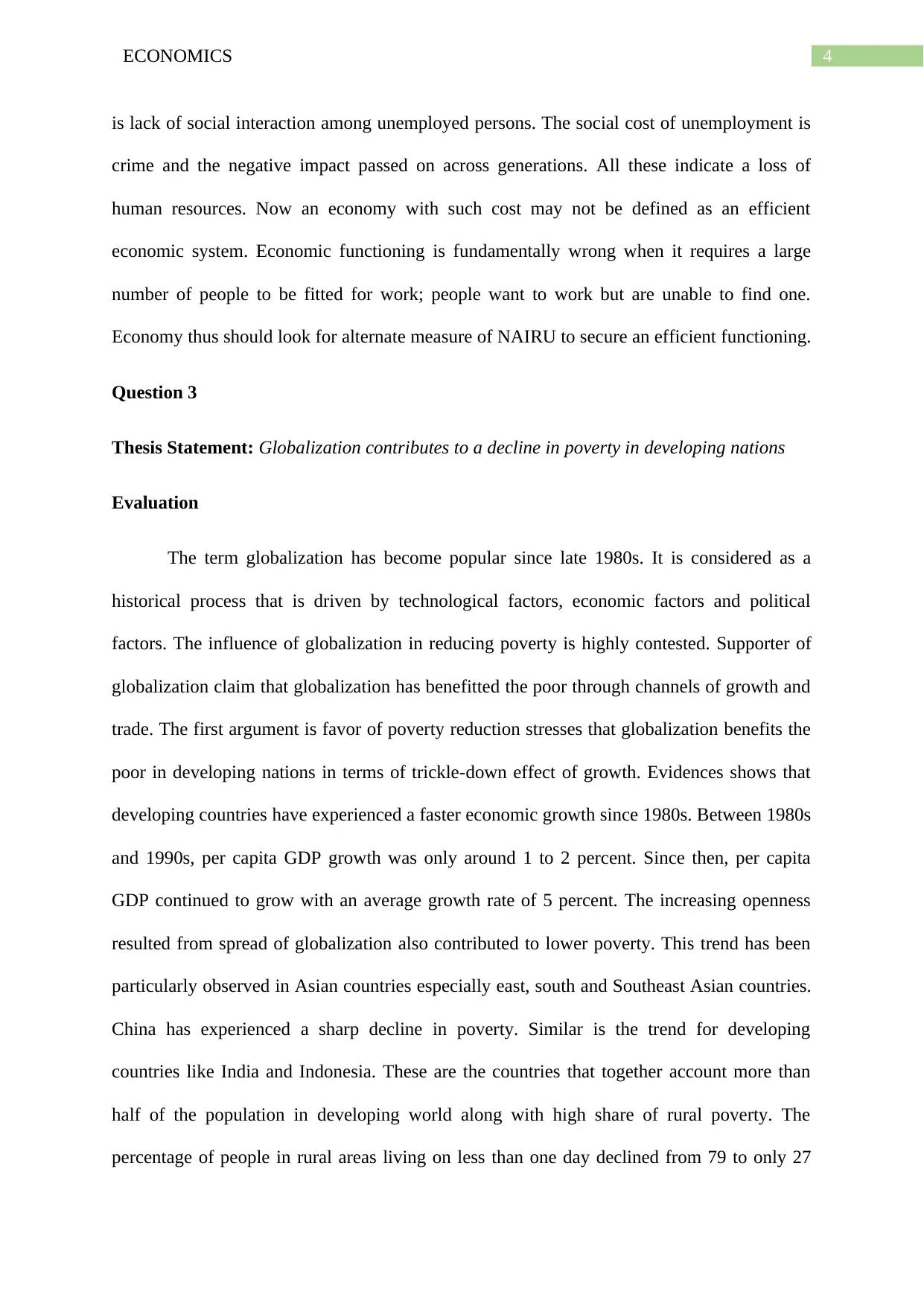
4ECONOMICS
is lack of social interaction among unemployed persons. The social cost of unemployment is
crime and the negative impact passed on across generations. All these indicate a loss of
human resources. Now an economy with such cost may not be defined as an efficient
economic system. Economic functioning is fundamentally wrong when it requires a large
number of people to be fitted for work; people want to work but are unable to find one.
Economy thus should look for alternate measure of NAIRU to secure an efficient functioning.
Question 3
Thesis Statement: Globalization contributes to a decline in poverty in developing nations
Evaluation
The term globalization has become popular since late 1980s. It is considered as a
historical process that is driven by technological factors, economic factors and political
factors. The influence of globalization in reducing poverty is highly contested. Supporter of
globalization claim that globalization has benefitted the poor through channels of growth and
trade. The first argument is favor of poverty reduction stresses that globalization benefits the
poor in developing nations in terms of trickle-down effect of growth. Evidences shows that
developing countries have experienced a faster economic growth since 1980s. Between 1980s
and 1990s, per capita GDP growth was only around 1 to 2 percent. Since then, per capita
GDP continued to grow with an average growth rate of 5 percent. The increasing openness
resulted from spread of globalization also contributed to lower poverty. This trend has been
particularly observed in Asian countries especially east, south and Southeast Asian countries.
China has experienced a sharp decline in poverty. Similar is the trend for developing
countries like India and Indonesia. These are the countries that together account more than
half of the population in developing world along with high share of rural poverty. The
percentage of people in rural areas living on less than one day declined from 79 to only 27
is lack of social interaction among unemployed persons. The social cost of unemployment is
crime and the negative impact passed on across generations. All these indicate a loss of
human resources. Now an economy with such cost may not be defined as an efficient
economic system. Economic functioning is fundamentally wrong when it requires a large
number of people to be fitted for work; people want to work but are unable to find one.
Economy thus should look for alternate measure of NAIRU to secure an efficient functioning.
Question 3
Thesis Statement: Globalization contributes to a decline in poverty in developing nations
Evaluation
The term globalization has become popular since late 1980s. It is considered as a
historical process that is driven by technological factors, economic factors and political
factors. The influence of globalization in reducing poverty is highly contested. Supporter of
globalization claim that globalization has benefitted the poor through channels of growth and
trade. The first argument is favor of poverty reduction stresses that globalization benefits the
poor in developing nations in terms of trickle-down effect of growth. Evidences shows that
developing countries have experienced a faster economic growth since 1980s. Between 1980s
and 1990s, per capita GDP growth was only around 1 to 2 percent. Since then, per capita
GDP continued to grow with an average growth rate of 5 percent. The increasing openness
resulted from spread of globalization also contributed to lower poverty. This trend has been
particularly observed in Asian countries especially east, south and Southeast Asian countries.
China has experienced a sharp decline in poverty. Similar is the trend for developing
countries like India and Indonesia. These are the countries that together account more than
half of the population in developing world along with high share of rural poverty. The
percentage of people in rural areas living on less than one day declined from 79 to only 27
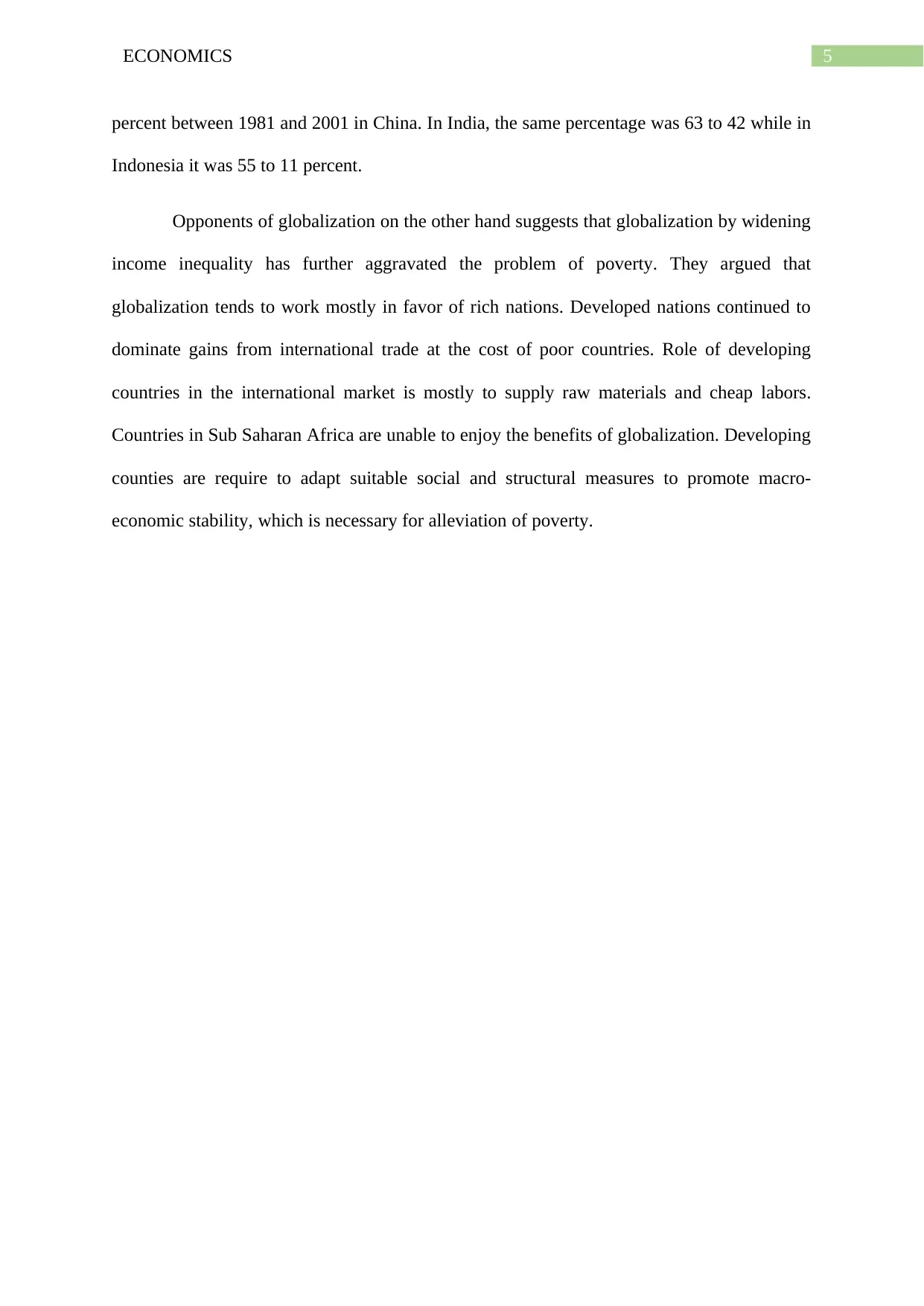
5ECONOMICS
percent between 1981 and 2001 in China. In India, the same percentage was 63 to 42 while in
Indonesia it was 55 to 11 percent.
Opponents of globalization on the other hand suggests that globalization by widening
income inequality has further aggravated the problem of poverty. They argued that
globalization tends to work mostly in favor of rich nations. Developed nations continued to
dominate gains from international trade at the cost of poor countries. Role of developing
countries in the international market is mostly to supply raw materials and cheap labors.
Countries in Sub Saharan Africa are unable to enjoy the benefits of globalization. Developing
counties are require to adapt suitable social and structural measures to promote macro-
economic stability, which is necessary for alleviation of poverty.
percent between 1981 and 2001 in China. In India, the same percentage was 63 to 42 while in
Indonesia it was 55 to 11 percent.
Opponents of globalization on the other hand suggests that globalization by widening
income inequality has further aggravated the problem of poverty. They argued that
globalization tends to work mostly in favor of rich nations. Developed nations continued to
dominate gains from international trade at the cost of poor countries. Role of developing
countries in the international market is mostly to supply raw materials and cheap labors.
Countries in Sub Saharan Africa are unable to enjoy the benefits of globalization. Developing
counties are require to adapt suitable social and structural measures to promote macro-
economic stability, which is necessary for alleviation of poverty.
⊘ This is a preview!⊘
Do you want full access?
Subscribe today to unlock all pages.

Trusted by 1+ million students worldwide
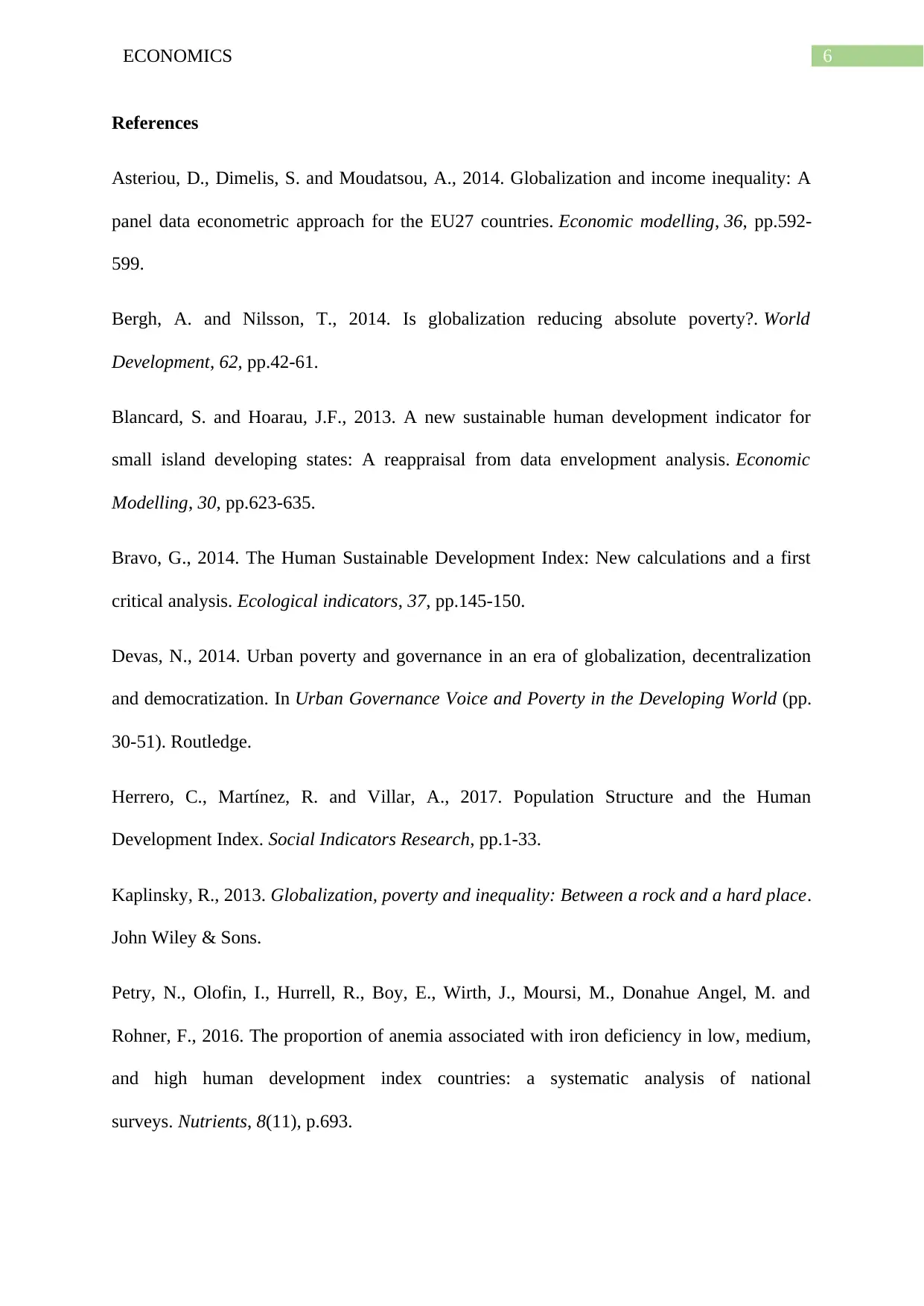
6ECONOMICS
References
Asteriou, D., Dimelis, S. and Moudatsou, A., 2014. Globalization and income inequality: A
panel data econometric approach for the EU27 countries. Economic modelling, 36, pp.592-
599.
Bergh, A. and Nilsson, T., 2014. Is globalization reducing absolute poverty?. World
Development, 62, pp.42-61.
Blancard, S. and Hoarau, J.F., 2013. A new sustainable human development indicator for
small island developing states: A reappraisal from data envelopment analysis. Economic
Modelling, 30, pp.623-635.
Bravo, G., 2014. The Human Sustainable Development Index: New calculations and a first
critical analysis. Ecological indicators, 37, pp.145-150.
Devas, N., 2014. Urban poverty and governance in an era of globalization, decentralization
and democratization. In Urban Governance Voice and Poverty in the Developing World (pp.
30-51). Routledge.
Herrero, C., Martínez, R. and Villar, A., 2017. Population Structure and the Human
Development Index. Social Indicators Research, pp.1-33.
Kaplinsky, R., 2013. Globalization, poverty and inequality: Between a rock and a hard place.
John Wiley & Sons.
Petry, N., Olofin, I., Hurrell, R., Boy, E., Wirth, J., Moursi, M., Donahue Angel, M. and
Rohner, F., 2016. The proportion of anemia associated with iron deficiency in low, medium,
and high human development index countries: a systematic analysis of national
surveys. Nutrients, 8(11), p.693.
References
Asteriou, D., Dimelis, S. and Moudatsou, A., 2014. Globalization and income inequality: A
panel data econometric approach for the EU27 countries. Economic modelling, 36, pp.592-
599.
Bergh, A. and Nilsson, T., 2014. Is globalization reducing absolute poverty?. World
Development, 62, pp.42-61.
Blancard, S. and Hoarau, J.F., 2013. A new sustainable human development indicator for
small island developing states: A reappraisal from data envelopment analysis. Economic
Modelling, 30, pp.623-635.
Bravo, G., 2014. The Human Sustainable Development Index: New calculations and a first
critical analysis. Ecological indicators, 37, pp.145-150.
Devas, N., 2014. Urban poverty and governance in an era of globalization, decentralization
and democratization. In Urban Governance Voice and Poverty in the Developing World (pp.
30-51). Routledge.
Herrero, C., Martínez, R. and Villar, A., 2017. Population Structure and the Human
Development Index. Social Indicators Research, pp.1-33.
Kaplinsky, R., 2013. Globalization, poverty and inequality: Between a rock and a hard place.
John Wiley & Sons.
Petry, N., Olofin, I., Hurrell, R., Boy, E., Wirth, J., Moursi, M., Donahue Angel, M. and
Rohner, F., 2016. The proportion of anemia associated with iron deficiency in low, medium,
and high human development index countries: a systematic analysis of national
surveys. Nutrients, 8(11), p.693.
1 out of 7
Related Documents
Your All-in-One AI-Powered Toolkit for Academic Success.
+13062052269
info@desklib.com
Available 24*7 on WhatsApp / Email
![[object Object]](/_next/static/media/star-bottom.7253800d.svg)
Unlock your academic potential
Copyright © 2020–2026 A2Z Services. All Rights Reserved. Developed and managed by ZUCOL.





